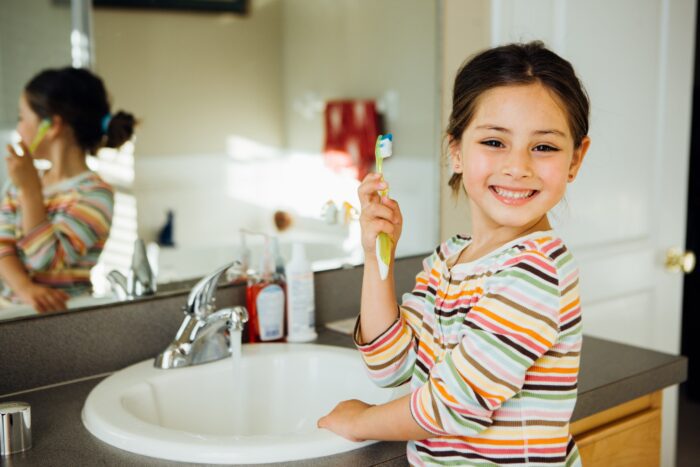Oral hygiene is a crucial process completed at home to keep your mouth clean. Patients of any age should brush their teeth at least twice per day and floss daily. Parents should make sure they introduce these good oral habits early so that kids can adhere to them as they grow up and keep their smiles looking and feeling their best.
But in order to receive the maximum benefits from oral hygiene, you must employ the right materials. Otherwise, you might not get your teeth as clean as necessary to prevent cavities and other dental problems. Check out these oral hygiene tools that your child should use in order to properly clean their smile.

Fresh Toothbrush
Your child should brush their teeth at least twice per day, morning and evening. This allows them to remove plaque and other build-ups from their smiles in a timely fashion. The best tool to use to do so is a toothbrush that features soft bristles. The softer texture will prove gentler to their developing teeth and gums while they learn to clean their smiles on their own.
An electric toothbrush may provide a more thorough cleaning while also being easier to use for young dental patients. Make sure you remember that toothbrushes must be replaced every three to four months. For electric toothbrushes, you will need to replace the heads every twelve weeks or so.
The bristles of a toothbrush wear down over time. You must toss an old brush and buy a new one when it begins to fray so that they do not lose effectiveness at cleaning.
Fluoride Toothpaste
For optimal oral cleanliness, your child will use toothpaste on their toothbrush. The abrasive ingredients in toothpaste improve the scrubbing capability of brushing so that they can achieve a complete clean in their smiles.
When choosing a toothpaste for your child, you should opt for a brand with the ADA seal of approval for a guaranteed effective clean. You also will want to pick a toothpaste that contains fluoride. This naturally occurring mineral will absorb into the teeth as they brush and fortify their enamel, the outermost layer of the teeth.
Stronger teeth are better able to resist cavities, surface stains, and other dental concerns. This will help them keep their smiles healthy for a longer period. Your dentist can tell you more about the benefits of fluoride during your next dental appointment.
Dental Floss
Flossing is just as important as brushing teeth when it comes to oral hygiene. A toothbrush alone will not reach the spaces between the teeth. But plaque will still accrue and hurt the smile in these areas.
Children must clean these parts of their smiles as well, so make sure you encourage your child to floss at least once per day. Traditional string floss is an effective way to accomplish this part of the oral hygiene regimen. But your child might also benefit from other flossing tools, like a water floss or floss pick.
